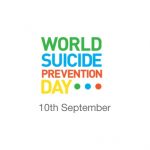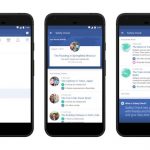Facebook uses World Suicide Prevention Day to highlight the support it offers

This Sunday -- September 10 -- is World Suicide Prevention Day. Facebook is using the global event to draw attention to the help it offers to those contemplating suicide.
The social network is planning to run ads in users' newsfeeds throughout the month, highlighting the supportive groups and suicide prevention tools that are available. Facebook is also launching a new Online Well-being portal which features advice about suicide prevention and how to resolve problems.
Facebook says it is likely Russia paid for polarizing political ads during US election

Speculation about Russian interference in the US election that saw Donald Trump propelled to presidency has been rife for months. Now Facebook has conceded that it's likely that a group operating out of Russia was responsible for taking out $100,000 worth of advertising that "focus[ed] on amplifying divisive social and political messages across the ideological spectrum."
The ads appeared between 2015 and 2017, and touched on polarizing topics such as gun rights, LGBT issues, race and immigration. Facebook is quick to point out that the advertising related to "inauthentic" accounts and Pages and that these have now been closed down, and the social network continues to help with federal inquiries into attempts to control the outcome of the 2016 election.
Night mode comes to Twitter on the web

Android and iOS users who like to browse Twitter in bed were pleased when a night mode was added to the mobile apps, saving middle-of-the-night blindings. Now night mode has made its way to the web.
Whether you see night mode as an eye-saving feature, or just a way to get in touch with your inner goth, the arrival of the feature has been long-awaited by users.
Facebook is overestimating its ad reach

Facebook ad metrics are facing scrutiny after it transpired the social network is overestimating the potential audience advertisers can expect to reach. A senior analyst from Pivotal Research Group points out that Facebook's Adverts Manager tool suggests demographic figures that exceed official numbers.
For example, advertisers are told that they could hit up to 41 million 18- to 24-year-olds in the US, but according to recent census data only 31 million 18- to 24-year-olds live in the US. The discrepancy is not isolated, as there are similar instances of inflated potential reach suggestions for various age groups in the US, UK and Canada.
Facebook offers millions to music industry to avert copyright crisis

Facebook is said to be offering hundreds of millions of dollars to music publishers and record labels to avoid having to take down user-generated videos that feature copyrighted music.
Bloomberg cites "people familiar with the matter" as saying Facebook's payments will allow for the legal use of songs in uploaded videos. At the moment rights holders can tell Facebook to remove any videos that feature copyrighted music, and the social network is keen to create a frictionless experience for users if at all possible.
Facebook Watch is now available right across the US

Facebook Watch may sound like it's going to be a cheap alternative to the Apple Watch, but it's really just Facebook's latest jump into video. Launched a month ago, Facebook Watch is now available to everyone in the US.
The initial launch was a limited one, and just last week the rollout expanded to a wider group of users. But now everyone in the US is able to see the Watch tab on desktop and mobile platforms, giving access to original video content.
47 percent of UK teens have been cyber bullied

According to a new study of 1,000 UK teenagers, 47 percent have been cyber bullied with 70 percent experiencing it on social media and Facebook being the most common platform.
The survey by McAfee reveals part of the problem appears to be that teens are not getting proper guidance at home or at school about staying safe online.
Facebook has mapped the location of millions of people down to 5-meter accuracy

If you've ever thought that Facebook knows a little too much about you, here's something that's going to do nothing to dislodge that fear from your mind. Using a combination of government census information and data from satellites, the social networking giant has mapped the location of people in 23 countries around the world.
In all, Facebook knows where millions of people live down to an accuracy of 5 meters. All of this has been made possible by a mapping technology developed by Facebook to help it see how people are distributed across the globe to determine how best to supply internet to different parts of the world.
30 percent of Americans would leak private data for $1,000

As we carry out more of our day-to-day transactions online, so the amount of information about us that exists out on the internet grows.
That means there are more and more opportunities for data to be leaked or stolen, but a new study by IT staffing company Modis reveals that people still aren't taking their privacy seriously.
Verified accounts are coming to WhatsApp

On various social media platforms, attaining a verified account is a major goal for users. It's something that's been available on Facebook for a while, and Twitter users from all walks of life are able to apply for verification. Soon to be added to this list is WhatsApp.
The messaging app -- owned by Facebook -- has not only started to verify certain business accounts, but is also planning to release a standalone app that will allow companies to chat with customers.
Facebook updates On This Day to make it even more remember-y

If you have yet to be granted access to Facebook's trip-down-memory-lane feature, On This Day, now you're in luck. The social network has opened up the feature to all of its two billion users.
At the same time, Facebook is introducing some interesting extras, and taking steps to ensure that more negative memories are not surfaced for you. On top of this, there are new seasonal memories and new ways to celebrate friendships.
Is Facebook down? Sort of... and there's a simple fix

Some online events unite people -- such as the recent solar eclipse which was streamed online by millions of people unable to see the spectacle in person. Another uniting event occurs when a major website goes down... like Facebook.
If you've tried to visit the social network today, you may well have found that the site doesn't load. "Is Facebook down?" you may ask, and you're not alone.
Facebook introduces a dedicated button to make it easier to access Safety Check

Facebook's Safety Check feature has been around for some time now, giving people the chance to use the social network to let friends and family know they're OK in the event of a natural disaster or other catastrophe.
It is Facebook that decides which events warrant activation of Safety Check, and until now it has also been down to the site to advertise the feature to users so they can either mark themselves safe, or check up on others -- but this is about to change.
Online abusers face stiffer penalties as social media hate crime will be treated as seriously as face-to-face offenses

Online hate crimes are to be treated as seriously as abuse offenses committed offline as the UK's Crown Prosecution Service (CPS) aims to crack down on abuse and harassment on the likes of Facebook and Twitter. New policies covering hate crime relating to race, religion disability, sexuality -- including, for the first time, specific bisexual hate crimes -- will lead to harsher sentences for offenders.
Alison Saunders, director of public prosecutions, wants to do more to fight online abuse because of the risk of it escalating into the sort of extremist hate seen in relation to events in Charlottesville. She says that abuse of all kind, and on all platforms, should be treated with equal severity.
Facebook will protect your privacy... when you're dead

Facebook won't -- usually -- hand over your private messages to anyone after you die. The social network has used a new blogging series called Hard Questions to reveal just how it handles deaths of its users.
The site's director of global policy management, Monika Bickert, says that Facebook aims to not only be sensitive, but also to respect the wishes of the deceased. After death, accounts are memorialized by default, but everyone is also free to create a "legacy contact" who will be able to mange their account in the event of their death. But Facebook is, it says, also keen to protect the privacy of survivors.
Recent Headlines
Most Commented Stories
BetaNews, your source for breaking tech news, reviews, and in-depth reporting since 1998.
© 1998-2025 BetaNews, Inc. All Rights Reserved. About Us - Privacy Policy - Cookie Policy - Sitemap.